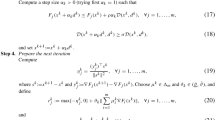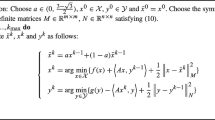Abstract
Linear Complementarity Problems (LCPs) belong to the class of \({\mathbb{NP}}\) -complete problems. Therefore we cannot expect a polynomial time solution method for LCPs without requiring some special property of the coefficient matrix. Our aim is to construct interior point algorithms which, according to the duality theorem in EP (Existentially Polynomial-time) form, in polynomial time either give a solution of the original problem or detects the lack of property \({\mathcal{P}_*(\tilde\kappa)}\) , with arbitrary large, but apriori fixed \({\tilde\kappa}\)). In the latter case, the algorithms give a polynomial size certificate depending on parameter \({\tilde{\kappa}}\) , the initial interior point and the input size of the LCP). We give the general idea of an EP-modification of interior point algorithms and adapt this modification to long-step path-following interior point algorithms.
Similar content being viewed by others
References
Cameron, K., Edmonds, J.: Existentially polytime theorems. In: Polyhedral Combinatorics (Morristown, NJ, 1989), DIMACS Series in Discrete Mathematics and Theoretical Computer Science Discrete series 1, pp. 83–100. American Mathematical Society, Providence, RI (1990)
Cottle R.W., Pang J.-S., Venkateswaran V.: Sufficient matrices and the linear complementarity problem. Linear Algebra Appl. 114/115, 231–249 (1989)
Csizmadia Zs., Illés T.: New criss-cross type algorithms for linear complementarity problems with sufficient matrices. Optim. Methods Software 21, 247–266 (2006)
den Hertog D., Roos C., Terlaky T.: The Linear Complementarity Problem, Sufficient Matrices and the Criss–Cross Method. Linear Algebra Appl. 187, 1–14 (1993)
Fukuda K., Terlaky T.: Linear complementarity and oriented matroids. J. Oper. Res. Soc. Jpn. 35, 45–61 (1992)
Fukuda K., Namiki M., Tamura A.: EP theorems and linear complementarity problems. Discrete Appl. Math. 84, 107–119 (1998)
Guu S.-M., Cottle R.W.: On a subclass of P 0. Linear Algebra Appl. 223/224, 325–335 (1995)
Illés T., Roos, C., Terlaky, T.: Polynomial affine-scaling algorithms for P *(κ) linear complementarity problems. In: Gritzmann, P., Horst, R., Sachs, E., Tichatschke, R. (eds.) Recent Advances in Optimization, Proceedings of the 8th French-German Conference on Optimization, Trier, 21–26 July 1996, Lecture Notes in Economics and Mathematical Systems, vol. 452, pp. 119–137. Springer Verlag (1997)
Illés T., Peng J., Roos C., Terlaky T.: A strongly polynomial rounding procedure yielding a maximally complementary solution for P *(κ) linear complementarity problems (2000). SIAM J. Optim. 11(2), 320–340 (2000)
Illés T., Nagy, M., Terlaky, T.: EP theorem for dual linear complementarity problems. J. Optim. Theory Appl. series 139(3), (2008)
Jansen B., Roos C., Terlaky T.: A family of polynomial affine scaling algorithms for positive semi-definite linear complementarity problems. SIAM J. Optim. 7, 126–140 (1996)
Kojima M., Mizuno S., Yoshise A.: A polynomial-time algorithm for a class of linear complementarity problems. Math. Program. 44, 1–26 (1989)
Kojima, M., Megiddo, N., Noma, T., Yoshise, A.: A unified approach to interior point algorithms for linear complementarity problems. Lecture Notes in Computer Science, vol. 538. Springer Verlag, Berlin, Germany (1991)
Murty K.G.: Linear and Combinatorial Programming. Wiley, New York-London-Sydney (1976)
Peng, J., Roos, C., Terlaky, T.: New complexity analysis of primal-dual Newton methods for P *(κ) linear complementarity problems. In: Frenk, J.B.G., Roos, C., Terlaky, T., Zhang, S. High Performance Optimization Techniques, pp. 245–266. Kluwer Academic Publishers, Dordrecht (1999)
Potra F.A.: The Mizuno-Todd-Ye algorithm in a larger neighborhood of the central path. Eur. J. Oper. Res. 143, 257–267 (2002)
Potra F.A., Liu X.: Predictor-corrector methods for sufficient linear complementarity problems in a wide neighborhood of the central path. Optim. Methods Software 20(1), 145–168 (2005)
Roos, C., Terlaky, T., Vial, J.-Ph.: Theory and Algorithms for Linear Optimization, An Interior Point Approach. Wiley-Interscience Series in Discrete Mathematics and Optimization, Wiley, New York, USA, 1997 (Second edition: Interior Point Methods for Linear Optimization, Springer, New York) (2006)
Väliaho H.: P *-matrices are just sufficient. Linear Algebra Appl. 239, 103–108 (1996)
Väliaho H.: Determining the handicap of a sufficient matrix. Linear Algebra Appl. 253, 279–298 (1997)
Ye Y., Anstreicher K.: On quadratic and \({O(\sqrt{n}L)}\) convergence of a predictor-corrector algorithm for LCP. Math. Program. 62, 537–551 (1993)
Author information
Authors and Affiliations
Corresponding author
Additional information
The research of Tibor Illés and Marianna Nagy has been supported by the Hungarian National Research Fund OTKA No. T 049789 and by the Hungarian Science and Technology Foundation TÉT SLO-4/2005. Supported by an NSERC Discovery grant, MITACS and the Canada Research Chair program.
Rights and permissions
About this article
Cite this article
Illés, T., Nagy, M. & Terlaky, T. A polynomial path-following interior point algorithm for general linear complementarity problems. J Glob Optim 47, 329–342 (2010). https://doi.org/10.1007/s10898-008-9348-0
Received:
Accepted:
Published:
Issue Date:
DOI: https://doi.org/10.1007/s10898-008-9348-0




